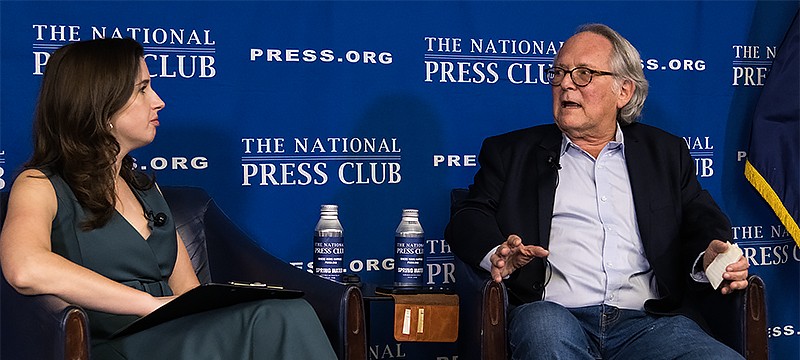Media covered up 1980 Iran hostage deal, the ‘October surprise,’ author tells Club
Since April 1991, Craig Unger has been ringing the bell on allegations that Ronald Reagan’s 1980 campaign worked behind the scenes on a hostage deal with Iran – called the “October surprise” -- that would benefit the candidate at the expense of Jimmy Carter in that year’s election.
Unger has a new book out on the topic, not his first book on this issue, and he used a National Press Club Headliners Book Event on Oct 22 to restate why the conspiracy matters now more than ever, just days away from the Nov 5 Presidential election.
“I’ve written six books on the Republican assault on democracy. This one was different. It’s personal,” Unger said before a small but focused crowd. “To me it bordered on treason,” he added, in a conversation led by Club President Emily Wilkins.

Unger, whose book “Den of Spies: Reagan, Carter, and the Secret History of the Treason that Stole the White House,” published Oct. 1, says that the issues around the case are larger than questions about our national security apparatus and the role of international politics in a domestic election; it’s about the media.
“One of the great disgraces of our national media in covering this up,” said Unger, who has worked as deputy editor of the New York Observer and editor-in-chief of Boston Magazine. “It was a great scandal and they twisted it and turned it on its ass.”
Although some of the history is still contested, the facts are not. President Jimmy Carter was unable to get American hostages released from Iran. In November 1980, he lost the election to Reagan. In January 1981, just minutes after Reagan was sworn in, the hostages were released.
In his remarks, Unger described how he first came upon the story many years later and turned it into a 10,000 word explosive piece for Esquire magazine. Not long after the piece hit, Unger says he was hired by Newsweek magazine and turned loose to do more investigative work; but “that’s when things went south,” he says.
Unger claims that soon after settling in at Newsweek, his stories about this topic were spiked by editors there Worse, they printed stories that essentially washed over the explosive charges about the hostage deal, he said.
Unger reserved his most intense criticism for the Washington Post, which owned Newsweek at the time and, he says, had an outsize role in quietly killing the story. He’s also equally critical of Congressional Democrats, who he claims never pursued the dramatic charges as earnestly as they should have.
“Democrats were lap dogs,” Unger said, noting that some of the best evidence in the case was stashed away under a tampon machine.
Unger was asked about non-presidents engaging in foreign policy, a reference to the damning reports of former President Donald Trump engaging with Russian President Vladmir Putin, besides also being close with Benjamin Netanyahu and Mohammed bin Salman, of Saudi Arabia. Unger said that nobody has ever done what the Reagan campaign team did, though only history and time may reveal all the ways in which Trump has looked overseas to benefit himself.
In some of his parting words, Unger noted that the great muckraker I.F. Stone was one of his mentors. Stone warned Unger about the perils of ‘access journalism’ epitomized by the White House Correspondents Dinner and the Gridiron Club, two beloved traditions in Washington journalism.
“If you start hanging around with them [sources] you are going to be carrying water for them,” Unger quotes Stone. Unger has taken the advice to heart, and maintains an independence from the madding crowd today, just as he did 40 years ago.

